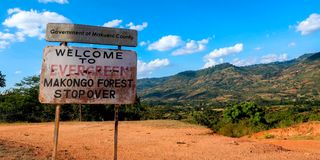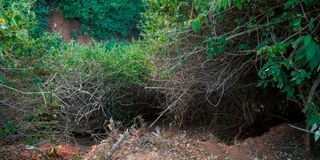
British national Campbell Scott, whose body was found in a forest in Makueni.
Campbell Scott intended to mix business with pleasure, much like anyone else, when he arrived in Nairobi for a week-long trip on February 16, 2025.
The plan was simple: Prepare for business meetings, then knock back a few cold beers. Launch a product his company, FICO, developed in conjunction with TransUnion, one of only three licensed credit reference bureaus in Kenya, and then go see some sights.
But what should have been a memorable trip to one of Africa’s most touted business and tourism destinations, and which Scott might have recommended to his family and friends, turned into a tragic excursion within 48 hours.
On Thursday February 27, Chief Government Pathologist Johansen Oduor said that further tests will be conducted on samples conducted on Scott’s body, including a toxicology screening to determine the cause of death.
Dr Oduor said that the head and multiple soft tissue injuries on the Briton’s body were too minor to have caused his death.
Scott checked into the JW Marriott at around 1 pm on that Saturday. A warm afternoon, with temperatures rising to 28 degrees. To some, it was inviting for a few cold beers.
The Scotsman strolled to Havana Bar & Restaurant along Woodvale Grove in Westlands, about one kilometre from the five-star hotel, after a little small talk with some of the hotel staff.
He seemed jovial, and happy to be in Nairobi.
At Havana, Scott was in the company of a man who has been in the wind since February 16, and who police believe could be among the Briton’s killers.
They spent at least two hours at Havana, after which Scott walked back to the JW Marriott alone.
He briefly spoke with hotel staff again before going to his room.
The following morning, Scott had his breakfast and hang around the hotel until around 11.15 am.
His home country was participating in the prestigious Six Nations Championship, an annual rugby tournament that pits Scotland, England, Wales, Ireland, France and Italy against each other.
The weekend before Scott’s trip, Scotland had lost 18-32 to champions Ireland.
The weekend after his arrival in Nairobi, the Scots were to take on England, a match that the latter narrowly won 16-15.
Perhaps in a show of solidarity with his national team and anticipation of their upcoming match against perennial rivals, Scott donned a Scotland rugby jersey.
He also had green cargo shorts on, and red Adidas sneakers.
His eyeglasses hang atop his clean-shaven head.
The burly Scotsman left JW Marriott at 11.15am on February 16, did the one kilometre trek to Havana Bar & Restaurant, and reunited with his unidentified friend from the previous day.
Police are yet to reveal whether witnesses have pointed to the two planning their second meeting.
But from the CCTV footage reviewed by officers from different police units, the two seemed to have struck a friendship.
On that Sunday, they spent more time at Havana Bar & Restaurant.
The mystery man, who is one of the prime suspects at the moment, hailed a taxi on his phone.
Scott and the mystery man walked out of Havana at 4.39pm, to board the taxi which was to drop them off in Pipeline, a suburb just over 17 kilometres from Havana Bar & Restaurant.
From the witnesses who have spoken with police, that was Scott’s last sighting, although the Directorate of Criminal Investigations (DCI) intelligence division would later get tip-offs, albeit when it was too late to save Scott from his killers.
Michael Edward Manaton, one of Scott’s colleagues at FICO and who was also in Nairobi for the same product launch, wanted to have a sit-down to plan for the big project which their employer hopes will attract clients in Kenya and across the world.

A photo taken on February 24, 2025, showing a Makongo Forest signpost near the location where the body of Briton Campbell Scott was found.
FICO, an American data analytics firm focusing on credit review, has partnered with TransUnion, one of only three licensed credit reference bureaus in Kenya, on a product intended to help digital lending firms and banks to assess borrowers’ credit risk.
The partnership involves merging two products – FICO’s FicoScore and TransUnion’s CreditVision.
At around 6 pm, Manaton called Scott’s UK-registered phone number, but it was switched off.
He did not know it yet, but Scott was in Pipeline at the time.
Manaton thought Scott’s phone had run out of charge, and that the two would eventually meet and schedule a meeting to prepare for the product launch.
An hour later, he tried again.
Scott’s phone was still switched off.
He now started to worry, as Scott had not communicated his whereabouts or plans that day.
JW Marriott staff advised Manaton to file a missing person report and escorted him to Parklands police station, approximately 850 metres away.
“STAPOLS (station police commanders) kindly keep a sharp lookout and if traced inform this end for action. CRO (criminal records office) Nairobi circulate in your next issue of KPG,” Inspector Weldon Kipkirui stated in the occurrence book on the night of February 17.
Early morning on February 18, the Directorate of Criminal Investigation (DCI) formally joined the case, and roped in their Crime Intelligence Research Bureau.
Detectives combed several bars in the Westlands area, looking for anyone who may have interacted with or seen Scott.
By that evening, a request had been put into Interpol to assist in tracking Scott’s movements.
Four days later, the police had reviewed CCTV footage from Havana, and interviewed some witnesses from the nightclub, including staff.
They made the decision to detain the taxi driver and a waiter, as those were the two individuals police believed could give details on Scott’s last movements before being reported missing.
At around 2.46pm, as the police were preparing to make the arrests, their colleagues in Wote were receiving a disturbing, but not too unusual report.

A photo taken on February 24, 2025 at the location where the body of Briton Campbell Scott was dumped along Machakos-Wote highway
A herdsman in Mukuyuni had stumbled upon a green sack, from which a stench was emanating. It turned out to be a body.
The body was in police recorded as that of an unidentified African male. But it was Scott’s body, partly decomposed.
The Wote police believed that whoever dumped Scott’s body was trying to squeeze in under a culvert along the Wote-Machakos highway.
By then, triangulation of Scott’s phone had shown that it was switched off around the Wote area.
The following morning, the DCI was informed of the body that had been transferred to the Makueni County Referral Hospital mortuary.
They inform the British High Commission and Scott’s colleague, David Hornus, and arrange a trip to Makueni County Referral Hospital’s mortuary the following day, to identify the body.
Police at the time believed that Scott was in the Pipeline house, likely being tortured into granting access to his bank accounts.
On February 24, the team comprising DCI officers, British High Commission staff and Hornus drove to Wote and positively identified the body as Scott’s.
The following day, DCI officers returned to the Makongo forest scene and collected more evidence, as another group of their colleagues did the same at Havana.
On Thursday, Dr Oduor confirmed that the postmortem by Dr Njoroge was concluded, and that samples had been taken for further tests.







